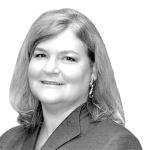
New Money: Clean Up
A look into the American Dental Association’s profitable licensing strategy.
We have a powerful brand with our members, so chances are that members will buy our books first.
The American Dental Association’s profitable licensing strategy.
A checkup of the licensing program at the American Dental Association shows that a solid strategy can help any association profitably repurpose products and content, says E. Ruth White, ADA’s manager of licensing and reseller programs.
Her department brings in $2.5 million annually through the licensing of ADA’s 230,000-name database, dental procedure codes used by insurance companies for reimbursement, and other content. The organization’s journal brings in another $165,000 a year via licensed articles and content. Other equally important returns on investment include building brand value, serving new international markets, and increasing public awareness about ADA and the importance of oral health.
ADA’s top licensing product, its set of dental procedure codes, encompasses several print and digital books, an app, and related continuing-education programs.
“Although that’s unique to us, if you have something valuable and unique in your industry, you can create a model like we have,” she says. “What you’re trying to do is get at everybody you can, so … I’m going to third parties and licensing the same codes to them.
“Technically, they’re creating competitive products, but they know we have a powerful brand with our members, so chances are that members will buy our books first. We did $1.8 million in book sales last year, and I still got $300,000 in licensing revenues.”
The strategy differs for ADA’s much-sought-after database of U.S. dental professionals. The association does not sell members’ email addresses or home or cellphone numbers, since it uses those exclusively to market its own products, White says. But it does sell names and addresses, which garner $2 million annually. One-time promotional use by companies generates half of that. The other half is sales of flat-rate, unlimited-use rights to buyers that use the list to distribute marketing materials and identify concentrated pockets of dental offices salespeople can visit.
To license ADA’s database, White uses a combined model with elements from both a list-manager and a list-broker arrangement.
Using a list manager means hiring one company with an exclusive agreement to manage and market a list and fulfill requests. “Here, it’s important that you control who uses the list, so we’ve created guidelines” of permissible uses, she says. “We also set the price, and the list manager takes a cut.”
With a list broker, ADA sets annual licensing fees and contracts multiple companies. “They pay us a fee just to access the names, plus every time they sell our names, they give us a fee,” says White. “The big difference is that they can set their rates.”
Overall, licensing provides revenue that would make any leader smile.
(Nick M. Do/ThinkStock)






Comments